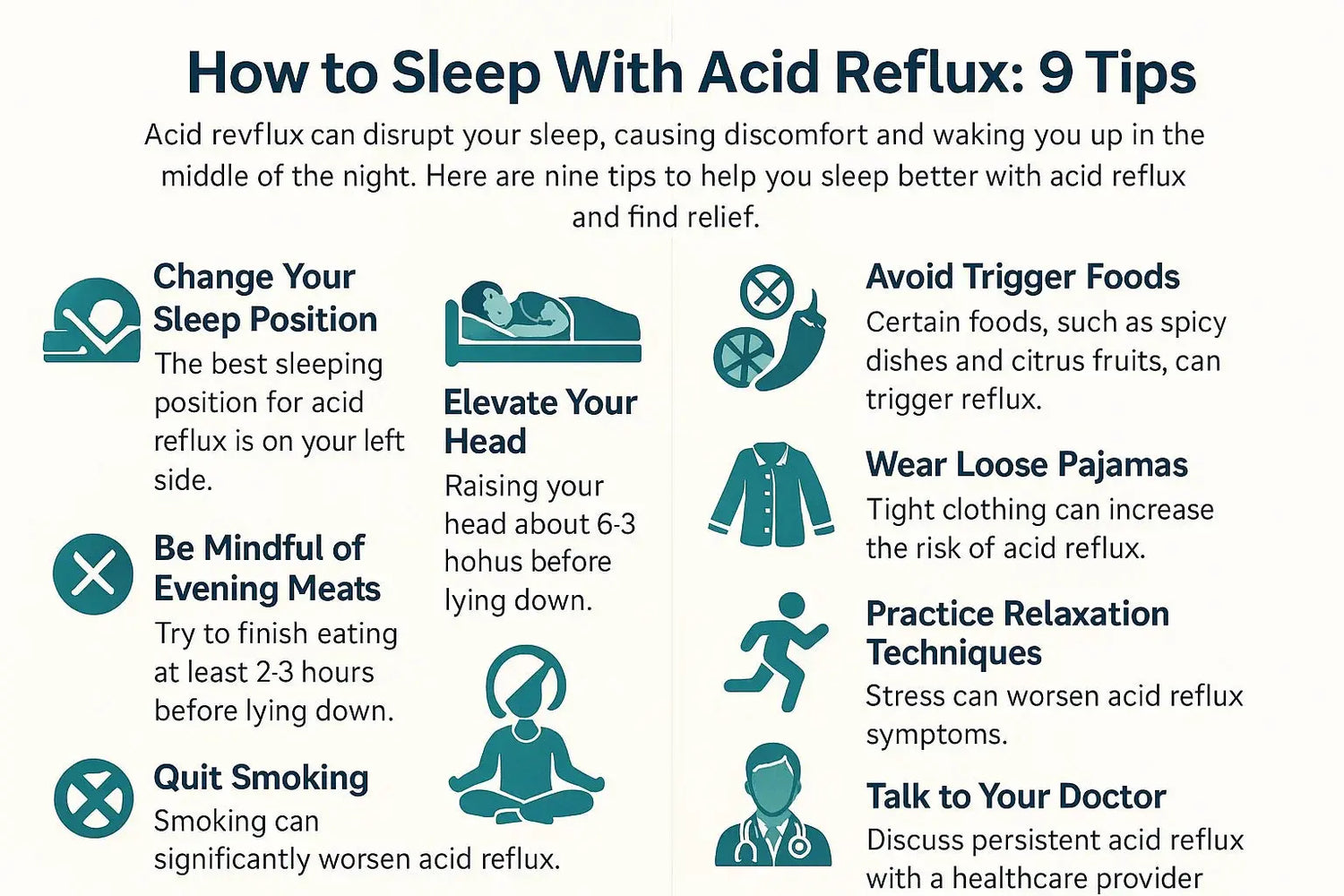
Dealing with acid reflux can make it difficult to get a good night’s sleep, often leading to discomfort and frequent wake-ups. The right sleep position, lifestyle adjustments, and a few strategic changes can significantly alleviate symptoms and improve your sleep quality. In this guide, we’ll explore nine effective tips to help you sleep better with acid reflux, from adjusting your sleep position to avoiding trigger foods. Whether you’re managing occasional heartburn or chronic acid reflux, these strategies can help you find relief and enjoy more restful, uninterrupted sleep.
- 1. Change Your Sleep Position
- 2. Elevate Your Head
- 3. Be Mindful of Evening Meals
- 4. Avoid Trigger Foods
- 5. Wear Loose Pajamas
- 6. Practice Relaxation Techniques
- 7. Wait Before Exercising
- 8. Quit Smoking
- 9. Talk to Your Doctor
- Heartburn vs. Acid Reflux vs. GERD
- Best Sleeping Position for Acid Reflux
- Table: Tips for Sleeping with Acid Reflux
1. Change Your Sleep Position
The best sleeping position for acid reflux is on your left side. This position helps keep the stomach below the esophagus, reducing the likelihood of acid backing up. Avoid lying flat on your back, as it may worsen symptoms.

2. Elevate Your Head
Raising your head about 6 to 8 inches helps gravity keep stomach acid from flowing into the esophagus. Use a wedge pillow or adjust your bed frame for optimal elevation to prevent acid reflux during sleep.
3. Be Mindful of Evening Meals
Try to finish eating at least 2-3 hours before lying down. Eating late can increase the likelihood of acid reflux as your body may not have time to digest food properly before bedtime.
4. Avoid Trigger Foods
Certain foods can trigger acid reflux, such as spicy dishes, citrus fruits, chocolate, and caffeine. Avoid these foods in the evening to reduce the risk of experiencing reflux during the night.
5. Wear Loose Pajamas
Tight clothing can put pressure on your stomach and increase the likelihood of acid reflux. Opt for loose, comfortable pajamas that don’t restrict your abdomen.
6. Practice Relaxation Techniques
Stress can worsen acid reflux symptoms. Before bed, practice relaxation techniques such as deep breathing, meditation, or gentle stretching to reduce stress and help you unwind for a better night’s sleep.
7. Wait Before Exercising
Avoid exercising too close to bedtime, as it can trigger acid reflux. Give your body at least 2-3 hours after physical activity before lying down.
8. Quit Smoking
Smoking can relax the lower esophageal sphincter, allowing stomach acid to rise. Quitting smoking can significantly reduce the frequency of acid reflux and improve overall health.
9. Talk to Your Doctor
If acid reflux persists, consider discussing it with your healthcare provider. Medications such as antacids or proton pump inhibitors (PPIs) may help control symptoms and prevent nighttime flare-ups.
Heartburn vs. Acid Reflux vs. GERD
While the terms heartburn, acid reflux, and GERD are often used interchangeably, they refer to different stages:
- Heartburn: A symptom of acid reflux, causing a burning sensation in the chest.
- Acid Reflux: The backward flow of stomach acid into the esophagus, causing discomfort.
- GERD (Gastroesophageal Reflux Disease): A more serious and chronic form of acid reflux that occurs more than twice a week and can cause damage to the esophagus.
Best Sleeping Position for Acid Reflux
As mentioned earlier, sleeping on your left side is the best position for acid reflux. It reduces the likelihood of stomach acid traveling up into the esophagus. Additionally, elevating the head of the bed can help keep the acid in place and improve sleep quality.
Table: Tips for Sleeping with Acid Reflux
| Tip | Description | Best For |
| Change Your Sleep Position | Sleep on your left side to reduce acid reflux symptoms | People with frequent acid reflux |
| Elevate Your Head | Raise your head 6-8 inches to keep acid in the stomach | Anyone experiencing nighttime reflux |
| Avoid Trigger Foods | Avoid spicy, citrus, and caffeine before bed | Those sensitive to certain foods |
| Wear Loose Pajamas | Choose loose-fitting clothing to prevent pressure on the abdomen | Preventing reflux from tight clothes |
| Practice Relaxation Techniques | Reduce stress with deep breathing or meditation before bed | Stress-related acid reflux sufferers |





